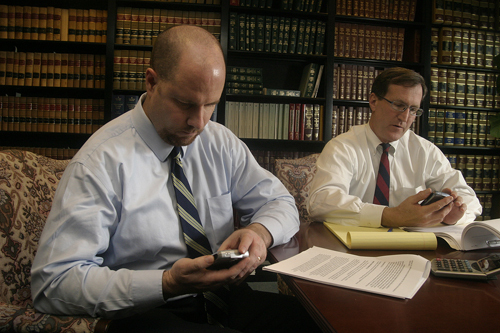
The slumping real estate market has not had a large effect on day-to-day commercial-property litigation, but it has changed the type of cases some attorneys who specialize in residential issues typically see, according to Rhode Island lawyers.
Disputes over building and property rights have followed the drop in the median price of residential properties in the Ocean State, said Jeffrey S. Brenner, a partner with Providence’s Nixon Peabody LLP.
Many Rhode Islander homeowners – especially those unable to sell their current homes because the market is falling – are opting to expand instead, he said.
“People say, ‘I need a bigger house, but I’m not going to be able to sell my house for what I thought I would get,’ ” Brenner said. “So what they’ll do is, they’ll spend some money and put on an addition.”
But that decision to expand can come with its own onerous legal battles.
“The closer you move to your neighbor, the more likely you’ll have litigation,” said Brenner, who also handles community land issues in his role as Barrington Town Council president. “Then you get issues of easements and adverse possessions. Where’s the lot line? That’s why surveyors are very busy now, too.”
Along with battles over residential subdivisions of rural property, legal battles over add-on construction have increased during the last year, Brenner said.
Although the current sales slump is increasing the amount of residential litigation, it hasn’t significantly affected commercial real estate transactions, Brenner said. Litigation in commercial real estate transactions, although common, isn’t usually affected by a downturn in the market, he said.
John R. Gowell Jr., a partner with Burns & Levinson LLP, agreed: “The economies of each sector , within the general caption of real estate, have different factors and features that will apply.”
The commercial market doesn’t depend as heavily on market rates – it’s based instead on individual buyer-and-seller terms, said Edward G. Avila, a partner with the Providence firm Roberts, Carroll, Feldstein & Peirce Inc.
“At least in my experience, right now, I have not seen the commercial market slow down,” Avila said. “Clearly, it’s not anywhere near what’s happening in the residential world.”
During the 20 years Avila has been practicing real estate law in the Ocean State, there has not been much change in the amount of commercial property litigation, even during down markets.
“The buyer might have a stronger position right now because there aren’t that many [properties] out there,” Avila said. “But over time, that happens. It just tilts a bit to who has the best bargaining position.”
There is, though, a “tighter squeeze” for developers who are about to start construction or are relying on financing. “I think the credit control that banks are doing is definitely tighter than it was a year ago,” Avila said of the commercial lending market.
While commercial lenders are taking fewer risks, dropping property values are leaving some developers without the money to complete their pendin gcommercial and residential projects, Brenner said.
“Because of the market, properties that were appraised at $1 million a year ago are now being appraised for less,” he said, adding that if a project’s value has dropped, a lender’s contribution will, too.
That financial strain can sometimes lead a buyer to hire a lawyer to negotiate a better price when the development hits the market, Gowell said.
“It’s difficult to predict what the economy is going to be like two or three years down the road, when the project is ready for the market,” he said. But that’s not entirely unique to the current market, he added.
“Any time you have a boom in any sector, whether it’s the dot.com boom of the 1990s or it’s something perceived as a residential real estate boom now, there can sometimes be overbuilding,” Gowell said. •












